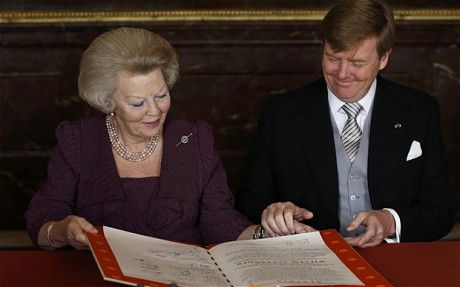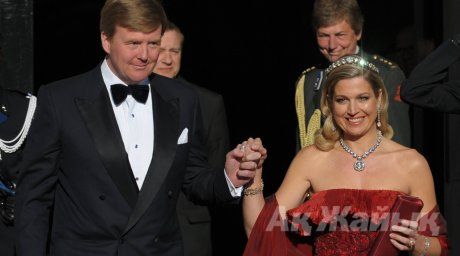 Queen Beatrix of Netherlands handed over her throne to her son Willem Alexander Queen Beatrix of the Netherlands has officially abdicated in favour of a "new generation", with her son Willem-Alexander becoming king.
Queen Beatrix of Netherlands handed over her throne to her son Willem Alexander Queen Beatrix of the Netherlands has officially abdicated in favour of a "new generation", with her son Willem-Alexander becoming king.
In a formal act of abdication the Dutch queen has become a princess handing over her throne to the Prince of Orange who is now King Willem-Alexander of the Netherlands.
"Today I make way for a new generation," said Queen Beatrix.
Before signing the state documents of the "act of abdication" inside the royal palace in Amsterdam, Queen Beatrix smiled, winked and took her son's hand, giving it a gentle squeeze in front of the cameras.
"I Queen Beatrix abdicate in favour of my son Willem-Alexander," said the legal act.
At that moment, as Queen Beatrix gave away her throne, a crowd of tens of thousands of Dutch people gathered on Dam Square burst into emotional applause, shouting "Thank you Bea", then to fall silent as giant televisions screen showed her in the act of signing away her throne.
The cheering began again and bells rang out eight minutes later after the signing by all 10 members of the royal House of Orange-Nassau and state officals.
 Dutch Crown Prince Willem-Alexander and his wife Crown Princess Maxima. ©ReutersTo rapturous applause at 10.30 am, princess Beatrix appeared on the palace balcony with King Willem-Alexander and his wife, Queen Maxima.
Dutch Crown Prince Willem-Alexander and his wife Crown Princess Maxima. ©ReutersTo rapturous applause at 10.30 am, princess Beatrix appeared on the palace balcony with King Willem-Alexander and his wife, Queen Maxima.
"I am happy and grateful to introduce to you your new king, Willem-Alexander," she said.
To more cheers, King Willem Alexander then turned to his mother Princess Beatrix. "Dear mother. You have given the kingdom 33 moving and inspired years, which we are intensely grateful for," he said. Facing back to the crowds, he shouted "Thank you".
As the crowd shouted "long live the king", Princess Beatrix told her son, "maybe you should wave a bit" before fetching her granddaughters to the balcony for the national anthem.
In her farewell speech to the nation on Monday night, Queen Beatrix thanked the Dutch people for over three decades of support and popular affection.
After abdicating her throne, the popular queen has become a princess and King Willem-Alexander and his wife, Queen Maxima, will become the heads of the Dutch royal House of Orange Nassau.
Millions of Dutch people will celebrate and Amsterdam's population is expected to double with at least 800,000 visitors flooding the city with orange painted faces, orange hats, wigs, flags and banners, the official colour of the Dutch royal house.
Over 10,000 police officers from all over Holland are on duty in the Dutch capital amid a security scare following the Boston marathon bombings.
The security focus has shifted from public order, there were riots when Beatrix was crowned in 1980, to loners after an attack on the Duch royals in 2009.
Four years ago to the day, a man drove his car at high speed into a Queen's Day parade which included Beatrix, King Willem-Alexander and other members of the royal family.
The vehicle drove at high speed through people lining a street watching the parade, killing eight people and missing the royals before crashing into a monument at the side of the road, killing the driver, Karst Tates.
No motive for the attack was ever establishedю
Thirty three years ago when Beatrix was crowned queen, riots were started by radical-left and anarchist squatters over the housing shortage in Amsterdam under the slogan, Geen woning, geen kroning or "no home, no coronation".
In today's Amsterdam, police monitoring crowds for loners like Karst Tates while putting the famous Dutch tolerance on display by allowing anti-monarchy protests
"The climate has changed, Amsterdam is a tolerant city. A placard saying 'Down with the queen' won't worry us," said Jan Pronker, the Amsterdam police commissioner in charge of security.
"But when more people demonstrate we will intervene and refer them to the designated protest areas in a friendly manner."
King Willem-Alexander's informal approach has won public support with his approval rating rising 10 points in the opinion polls to 69 per cent after a television interview last week where he said that people did not have to address him as "your majesty" unless they wanted to.
He faces some difficult decisions in the early days of his reign as the Netherlands, in the grip of eurozone austerity, debates the cost of its monarchy, which is the most expensive in Europe.
An IPSOS opinion published on Monday, found that half the Dutch population thinks that the £10 million cost of the investiture ceremony is too high, with 44 per cent wanting cuts to state funding of the royal house.
 В Атырау -10
В Атырау -10